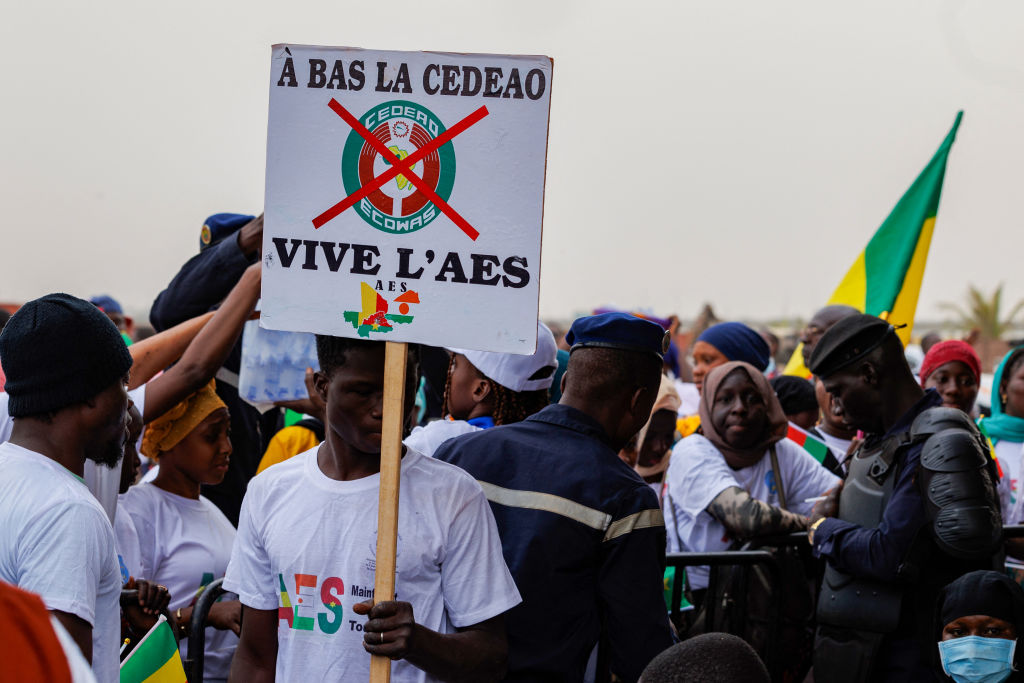Regional Blocs Struggle to Resolve Conflicts
ADF STAFF
Three military-led countries — Burkina Faso, Mali and Niger — dealt a blow to the Economic Community of West African States (ECOWAS) when they announced that they will leave the regional bloc.
It was one of several blows that have weakened regional bodies around the continent, as the organizations have struggled to deal with complex security and economic challenges.
The three junta-led countries quit ECOWAS on January 28 after the bloc had suspended and sanctioned them in an attempt to pressure the military rulers to return power to democratically elected leaders.
In a statement the next day, the Nigerian foreign ministry decried the announcement by “unelected leaders,” saying that the juntas were engaging in “public posturing to deny their people the sovereign right to make fundamental choices over their freedom of movement, freedom to trade and freedom to choose their own leaders.”
BBC Africa analyst Beverly Ochieng said the withdrawal didn’t come as a shock after the animosity grew between the three juntas and ECOWAS.
“This demonstrates in some way that ECOWAS may have exhausted some of its responses,” she said on a February 2 episode of BBC’s Africa Daily podcast. “It seems as if there’s no further way to engage.”
All three countries have been fighting insurgencies by armed groups associated with violent extremist transnational organizations al-Qaida and the Islamic State group. Ochieng said terrorists are taking advantage of a divided region.
“They don’t see borders,” she said. “They just carry out attacks wherever it is that they have an opportunity to. That can lead to miscommunication among security forces and even mistrust in how they patrol those borders and how they protect populations.”
Babacar Ndiaye, a senior fellow with the Senegal-based Timbuktu Institute for Peace Studies, said the withdrawal of the three Sahel states from the 49-year-old regional body would bring unprecedented change.
“It is the most challenging issue facing the subregion since its inception,” he told The Associated Press. “All the work they have put into building a collective security mechanism is based on the protocols that posit that democracy, good governance, and the rule of law will be the basis for peace and security.”
Aside from ECOWAS, which was created in 1975, most regional economic communities (REC) were created in the 1980s as the “building blocks” of the African Union.
When the signatories of the Abuja Treaty established the African Economic Community in 1991, they envisioned the 2020s as a decade of bold, harmonious integration.
An alliance of RECs would establish free-trade areas and customs unions in each bloc by 2021, a continental customs union by 2023, and a continental common market by 2025. By the end of 2028, they imagined an African parliament and a single currency.
The reality of 2024, however, is one of tensions and disagreements, terrorism and violent conflicts on the rise, with some member states ignoring RECs’ efforts to bring order and peace.
ECOWAS is not the only regional body shaken by conflict. Ethiopia, Somalia and Sudan each have snubbed recent mediation efforts by the Intergovernmental Authority on Development (IGAD).
The Sudanese Armed Forces and the paramilitary Rapid Support Forces have been fighting for more than 10 months in a war that has killed thousands of people and displaced more than 7 million. On January 20, Sudan’s foreign ministry announced that it was suspending its membership in IGAD, despite the bloc’s efforts to broker negotiations between the country’s warring parties.
Neither Ethiopia nor Somalia have been willing to negotiate via IGAD after the regional bloc demanded that Ethiopia withdraw from its contentious port access deal with Somaliland, a breakaway region of Somalia.
Short of calling these events a crisis for regional blocs, experts say there will be implications for regional mandates to ensure joint security and economic integration.
“I think this is a lesson,” Nigerian security analyst Jaye Gaskia told Voice of America. “ECOWAS needs to have protocols and mechanisms in place to begin to respond to that situation of insecurity and instability before it leads to a point where governments are actually overthrown.”
Ochieng said the underlying reasons for regional blocs to exist has not changed and still gives legitimacy to their interventions.
“Ultimately these blocs have to consider both political and military interventions because they already have an existing agreement,” she said. “But they have to build resilience in case there’s an instance of insecurity or in case there’s an instance of a political dispute that undermines economic cooperation.”


Comments are closed.